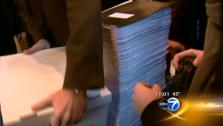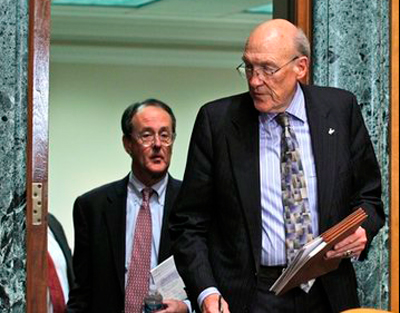Fox continues to suggest ending Bush tax cuts for wealthy would hurt small businesses Fox & Friends advanced several dubious claims to suggest that ending the Bush tax cuts for the wealthy would hurt "many small businesses" and hinder job growth. In fact, the Tax Policy Center has stated that only 2.5 percent of taxpayers who report business income on their individual tax returns would pay higher rates, and the Congressional Budget Office (CBO) has stated that extending tax cuts "does not create much incentive ... to hire more workers." Perino pushes claim that allowing Bush tax cut to expire would be "a terrible idea for job growth" Perino: "Raising taxes on anybody in a recession is a terrible idea for job growth." On the November 15 edition of Fox News' Fox & Friends, former Bush press secretary Dana Perino said that the White House needs to "cave" to Republicans on a plan to extend the Bush tax cuts for all income levels and claimed that "[r]aising taxes on anybody in a recession is a terrible idea for job growth." CBO: Extending tax cuts for wealthy "does not create much incentive ... to hire more workers"; is poor stimulus CBO: Extending tax cuts "does not create much incentive ... to hire more workers." CBO director Douglas Elmendorf stated in February written testimony that "[d]eferring the scheduled increases in tax rates in 2011 would help some businesses" but that "increasing the after-tax income of businesses typically does not create much incentive for them to hire more workers in order to produce more, because production depends principally on their ability to sell their products." Economists: Extending the tax cuts that benefit only the wealthy is poor stimulus. Howard Gleckman of the Tax Policy Center (TPC) wrote that "higher income households are more likely to bank the cash than spend it. As a result, tax cuts for these high-earners will do relatively little to boost the economy in the short run." CBO has also stated that as stimulus, allowing only the top tax cuts to expire "would be more cost-effective" than extending all of the cuts "because the higher-income households that would be excluded would probably save a larger fraction of their increase in after-tax income." Nobel Prize-winning economist Paul Krugman also said of extending the tax cuts for the wealthy: "[I]t's hard to think of a less cost-effective way to help the economy." CBO scored "[d]eferring the scheduled increases in tax rates" as the lowest-scoring policy proposal to stimulate economy. In a January 14 report on "Policies for Increasing Economic Growth and Employment in 2010 and 2011," CBO stated: [P]olicies that would temporarily increase the after-tax income of people with relatively high income, such as an across-the-board reduction in income taxes or an increase in the exemption amount for the AMT, would have smaller effects [than other options] because such tax cuts would probably not affect the recipients' spending significantly. The report further stated that "a permanent extension [of the Bush tax cuts] would entail large revenue losses after the recovery is over." According to a table in the report, CBO estimated that reducing income taxes in 2011 would have the least stimulative effect of the policy options considered. Perino advances dubious suggestion that Bush's tax cuts drove economic recovery Perino suggests that Bush tax cuts drove economic growth. Also on Fox & Friends, Perino suggested that Bush's tax cuts drove economic growth. Perino stated: "When he passed the tax cut bill in 2001, it was because he wanted to make it permanent, but it was because he also inherited a recession. He knew the best thing was to make sure that people that paid higher taxes had the capital that they needed to expand their businesses. That's how we create jobs." Economists have said that Bush tax cuts failed to produce substantial economic growth Nobel laureate Krugman: "But the real source of the expansion was the housing boom, which had very little to do with the tax cut." In a January 14, 2008, blog post, economist and Nobel Prize winner Paul Krugman wrote that "the real source of the expansion" after the 2001 recession "was the housing boom, which had very little to do with the tax cut": There were two main Bush tax cuts -- EGTRRA, enacted in mid-2001, and JGTRRA, enacted in 2003. [...] EGTRRA arrived in the middle of a recession, but that was an accident. It was devised in 1999, when the economy was booming, to defend Bush's right flank against Steve Forbes. During the 2000 campaign, Bush sold it as a way of returning budget surpluses to the people, with not a hint that it had something to do with fighting recession. The recession story was an after-the-fact reinvention. And EGTRRA didn't seem to help all that much. Formally, the recession ended in late 2001, but most labor-market indicators continued to worsen into mid-2003. JGTRRA, which mainly cut tax rates on capital gains and dividends, was followed by a real recovery. And the Bushies naturally claimed the credit. But the real source of the expansion was the housing boom, which had very little to do with the tax cut. Krugman: "But even now real G.D.P. is considerably lower than most people thought it would be back when President Bush was selling his tax cuts." Krugman wrote on October 18, 2005, that "[w]e had a recession followed by slow growth in the early Bush years, then faster growth after that as the economy recovered. But even now real G.D.P. is considerably lower than most people thought it would be back when President Bush was selling his tax cuts." He added: "At the end of the 1990's, people thought that the economy would grow at rates similar to those of the previous few years -- probably at more than 3 percent a year. In fact, economic growth since 2000 has averaged only about 2.5 percent, which is below expectations." CAP paper finds that "supply-side policies failed to deliver what supply-side theory predicted" regarding wage growth. As Center for American Progress' (CAP) Matthew Yglesias has noted, in a September 2008 CAP paper analyzing the impact of supply-side policy, Michael Ettlinger, Vice President for Economic Policy at American Progress, and Economic Policy Institute's John Irons wrote: Even during the period of expansion wages were often in decline in the first supply-side period. In the second period, wages were also in decline for portions of the period, and never strong. In the post-1993 period, wages were in decline at the start but wage growth grew substantially over the period. With such dismal wage growth during supply-side periods, supply-side policies failed to deliver what supply-side theory predicted. CAP's report also included the following graphs based on Bureau of Labor Statistics data comparing earnings growth during the Bush, Clinton, and Reagan eras: Fox advances Bush's misleading claim that "many small businesses" would be affected by tax increase Fox & Friends advances Bush's misleading claim that "many small businesses" would be affected if Bush tax cuts for the wealthy expire. On November 15, Fox & Friends aired a clip of former President George W. Bush stating: BUSH: I would remind people of this fact: that 70 percent of new jobs are created by small businesses. Many small businesses pay personal income tax because of how they're incorporated. If you're a subchapter S, you pay taxes at the individual income tax level. If you're a limited partnership, you pay tax at the personal income tax level. And therefore raising rates, the top rate, will cost small businesses capital necessary to expand. ... Which is what's necessary to create jobs. TPC and JCT: No more than 3% of taxpayers reporting business income would be affected TPC: "We don't know how many of these businesses are really small." On August 4, the Tax Policy Center blog stated that 2.5 percent of taxpayers who report business income on their individual tax returns would pay higher rates under President Obama's plan -- which would allow the Bush-era tax cuts on those making more than $250,000 to expire -- and that "we don't know how many of these businesses are really small": Most small businesses report their income on individual tax returns, either on Schedule C (for self-employment or sole proprietorships), Schedule E (for S corporations) or schedule F (for farms). We don't know how many of these businesses are really small, but next year about 36 million taxpayers will report income from these sources on their 1040s. Only about 900,000, or 2.5 percent, would pay higher rates if the Bush tax cuts were allowed to expire for those in the top brackets. However, that relative handful of business owners will report $400 billion, or almost 44 percent of all the business income included in individual returns. The TPC post further noted: "[A] half million top-bracket filers will report net positive business income averaging more than $700,000. These are the people--not the mom-and-pop business owners-- who would be hit by the expiration of the top bracket tax cuts. Who are they? Many are doctors, lawyers, and investors. Others are very successful entrepreneurs who may own a chain of grocery stores or dry cleaners, or a lot of real estate. Do they fit your image of a small business owner? That, I suppose, is in the eye of the beholder." JCT: "These figures for net positive business income do not imply that all of the income is from entities that might be considered 'small.' " A July 12 analysis of Obama's FY2011 Budget Proposals by the Joint Committee on Taxation stated that "three percent of all taxpayers with net positive business income" would see higher taxes under Obama's plan, adding that "[t]hese figures for net positive business income do not imply that all of the income is from entities that might be considered 'small' ": The proposal provides tax relief to a large percentage of taxpayers, which will provide incentives for these taxpayers to work, to save, and to invest and, thereby, will have a positive effect on the long-term health of the economy. The proposal also results in increased marginal tax rates on upper income taxpayers (as is provided for by the present-law sunset of EGTRRA), which will correspondingly reduce incentives for these taxpayers to work, to save, and to invest. Opponents of this latter aspect of the proposal often note that many small businesses, and a large fraction of small business income, will be adversely impacted by an increase in the top two tax rates. The staff of the Joint Committee on Taxation estimates that in 2011 just under 750,000 taxpayers with net positive business income (three percent of all taxpayers with net positive business income) will have marginal rates of 36 or 39.6 percent under the President's proposal, and that 50 percent of the approximately $1 trillion of aggregate net positive business income will be reported on returns that have a marginal rate of 36 or 39.6 percent. These figures for net positive business income do not imply that all of the income is from entities that might be considered "small." For example, in 2005, 12,862 S corporations and 6,658 partnerships had receipts of more than $50 million. JCT: "There is no legal requirement of any correspondence between the size of the business and the form of business organization." In a June 2008 document, JCT noted, "While many small businesses are organized as a sole proprietorship, a partnership, or an S corporation, not all businesses organized in those forms are small and not all businesses organized as C corporations are large." JCT further stated: In very general terms, it is not possible to relate the differences in tax consequences to any substantive non-tax attributes of these different legal forms of doing business, except that businesses that wish to access the public capital markets generally must be taxed as regular (so-called "C") corporations. Indeed, the Code affords business enterprises and their owners the effective flexibility to elect one tax regime or another without varying any of the meaningful non-tax substantive relationships among the enterprise and its owners. [...] All forms of entities may be used by business enterprises of any size, from very small to very large, whether measured by assets or revenues. S corporation rules restrict the number and type of shareholders, but an S corporation may have thousands of employees and unlimited equity valuation. [...] While one may often associate small businesses with organization in the form of a sole proprietorship, a partnership, or an S corporation, there is no legal requirement of any correspondence between the size of the business and the form of business organization. While many small businesses are organized as a sole proprietorship, a partnership, or an S corporation, not all businesses organized in those forms are small and not all businesses organized as C corporations are large. | 













